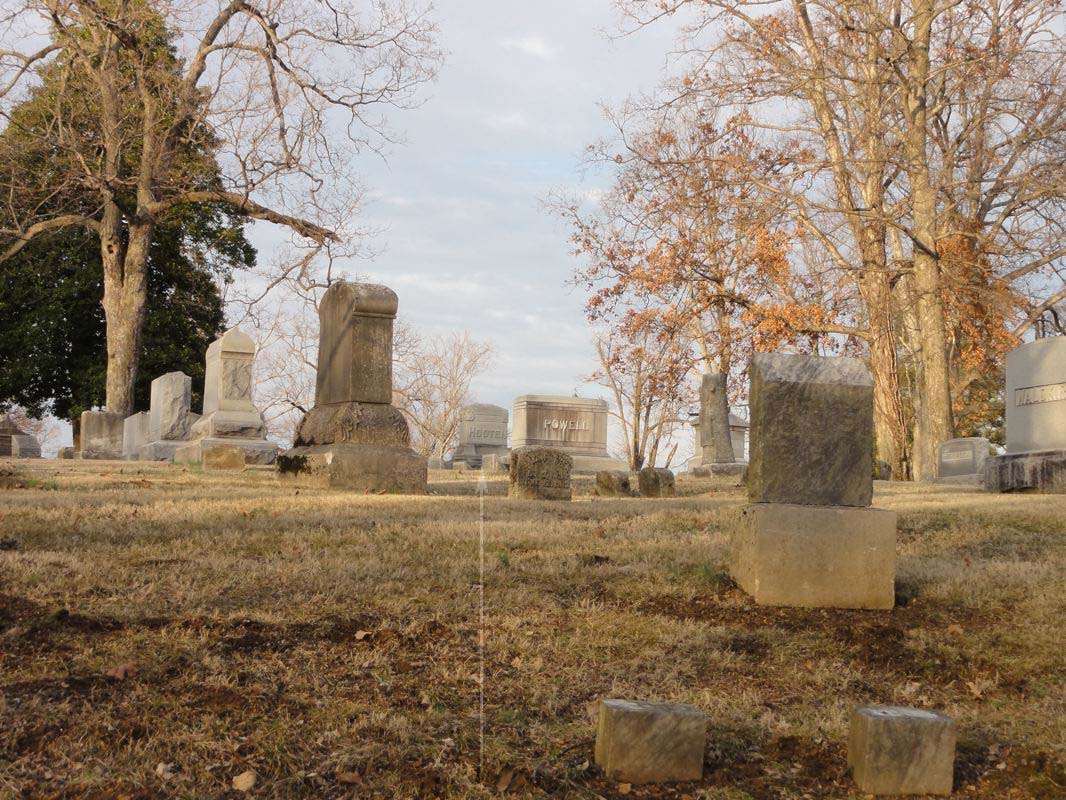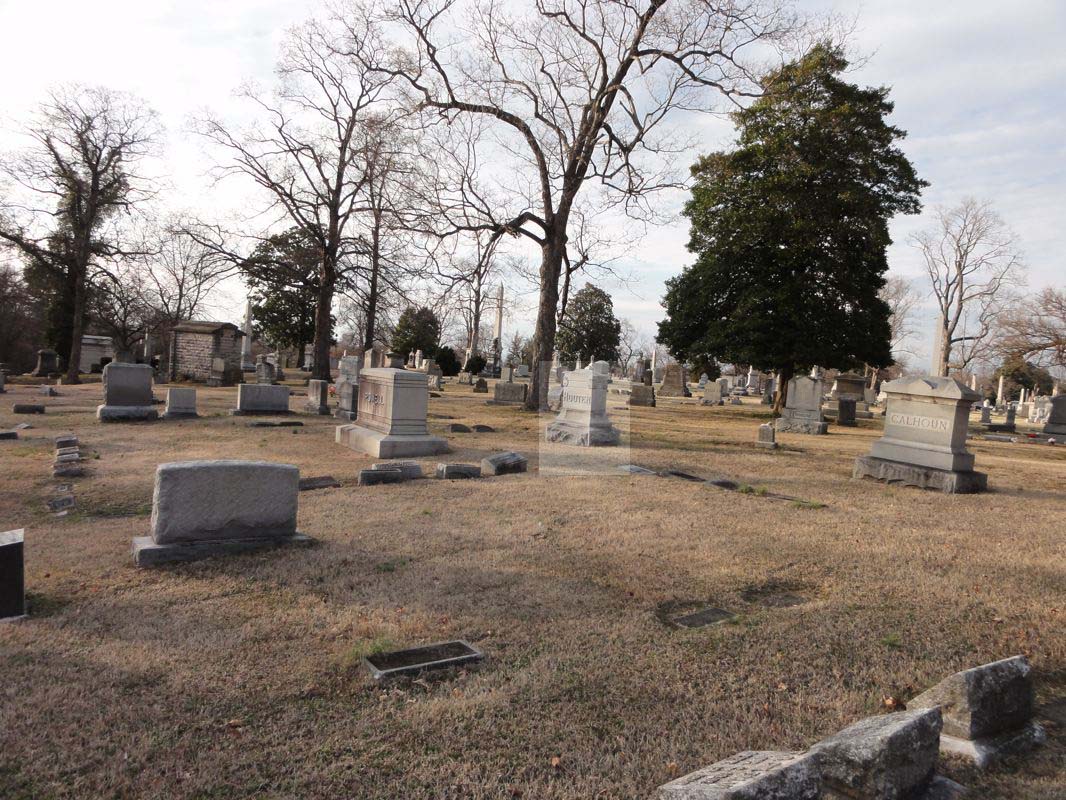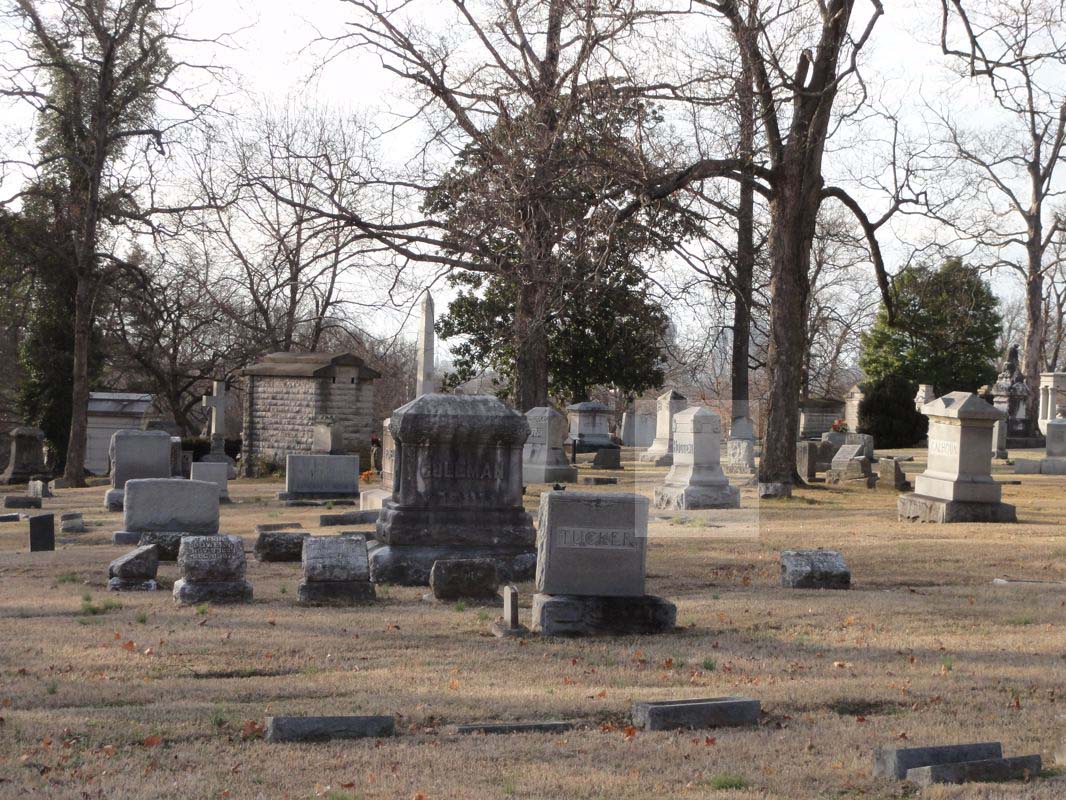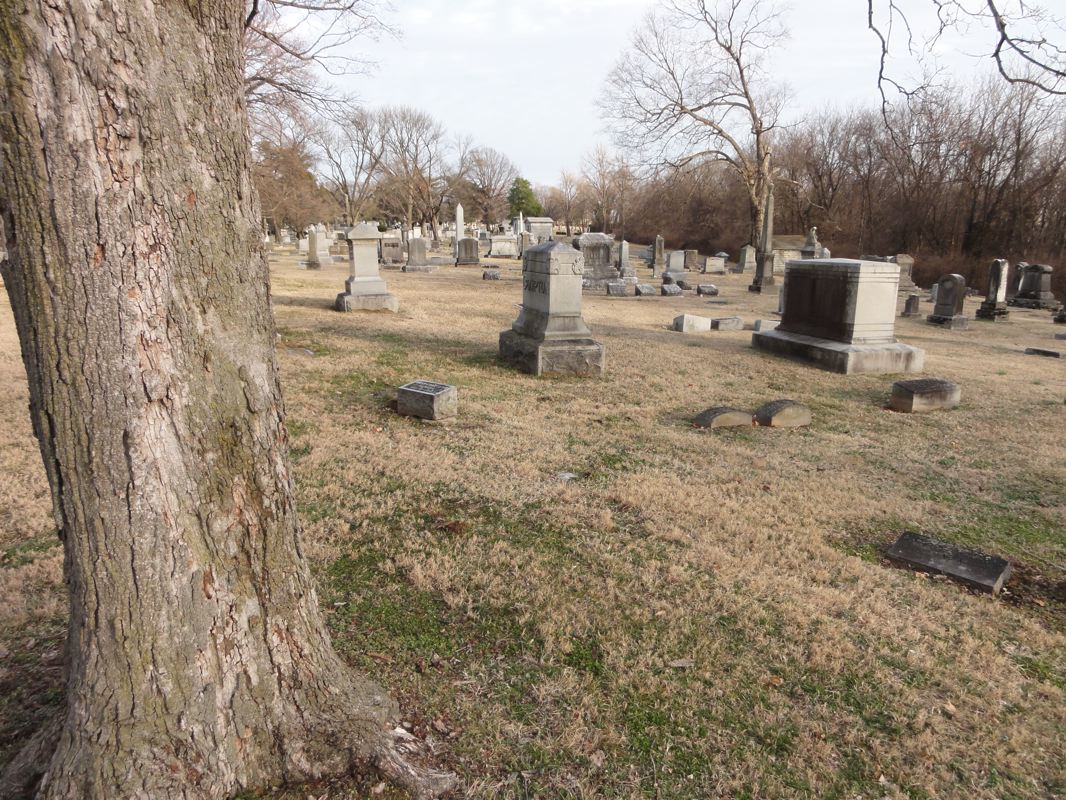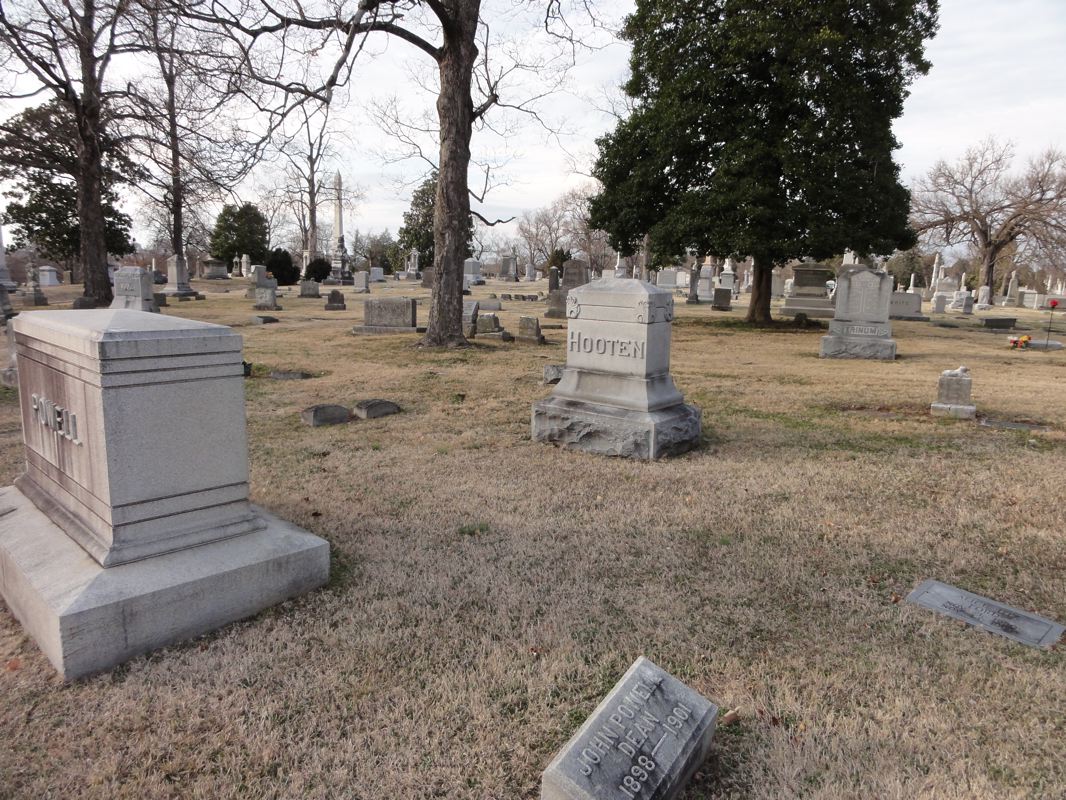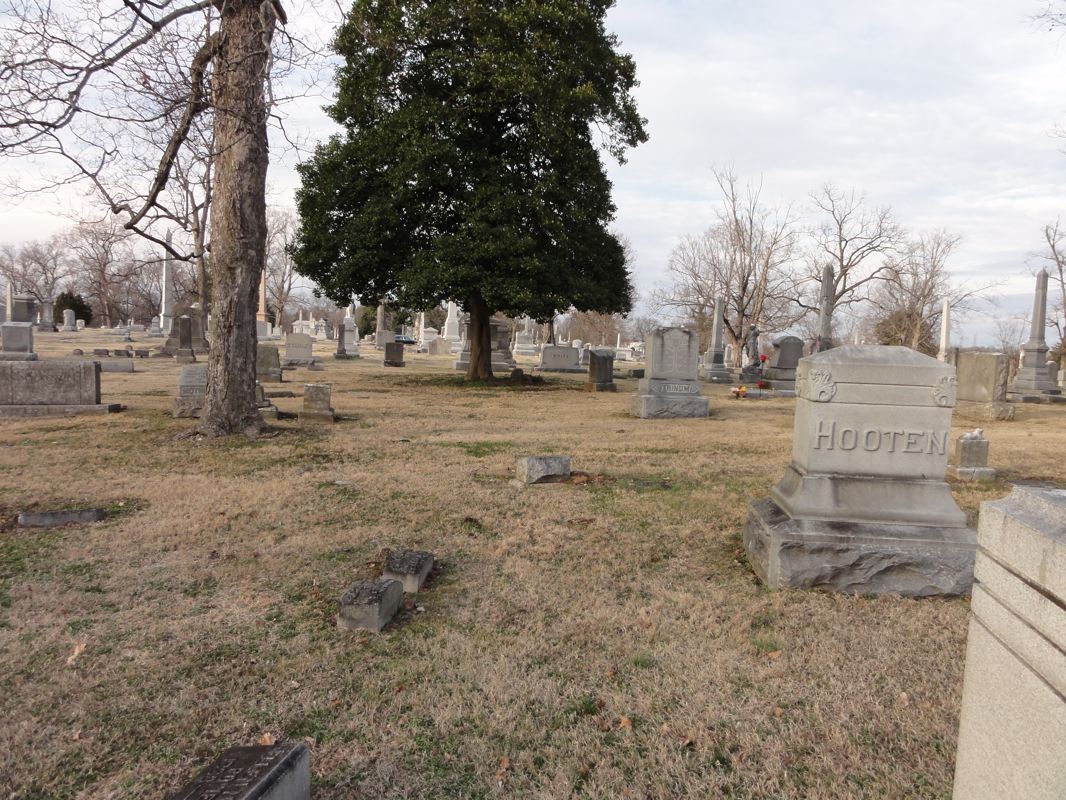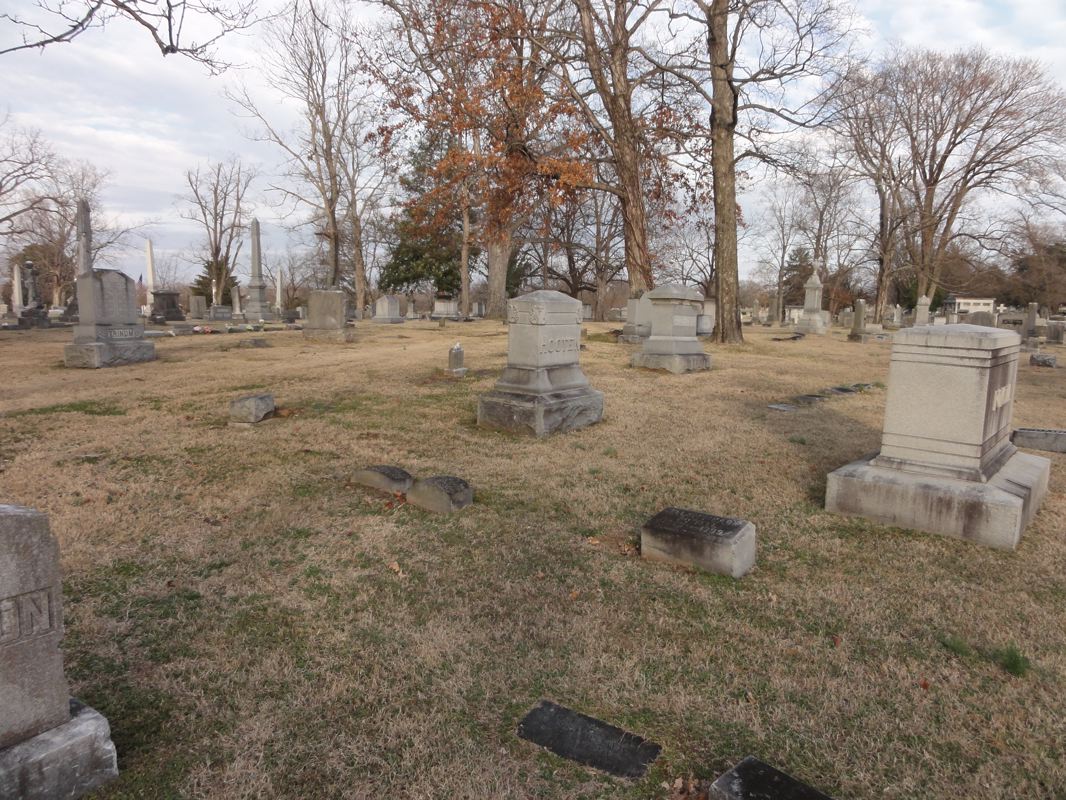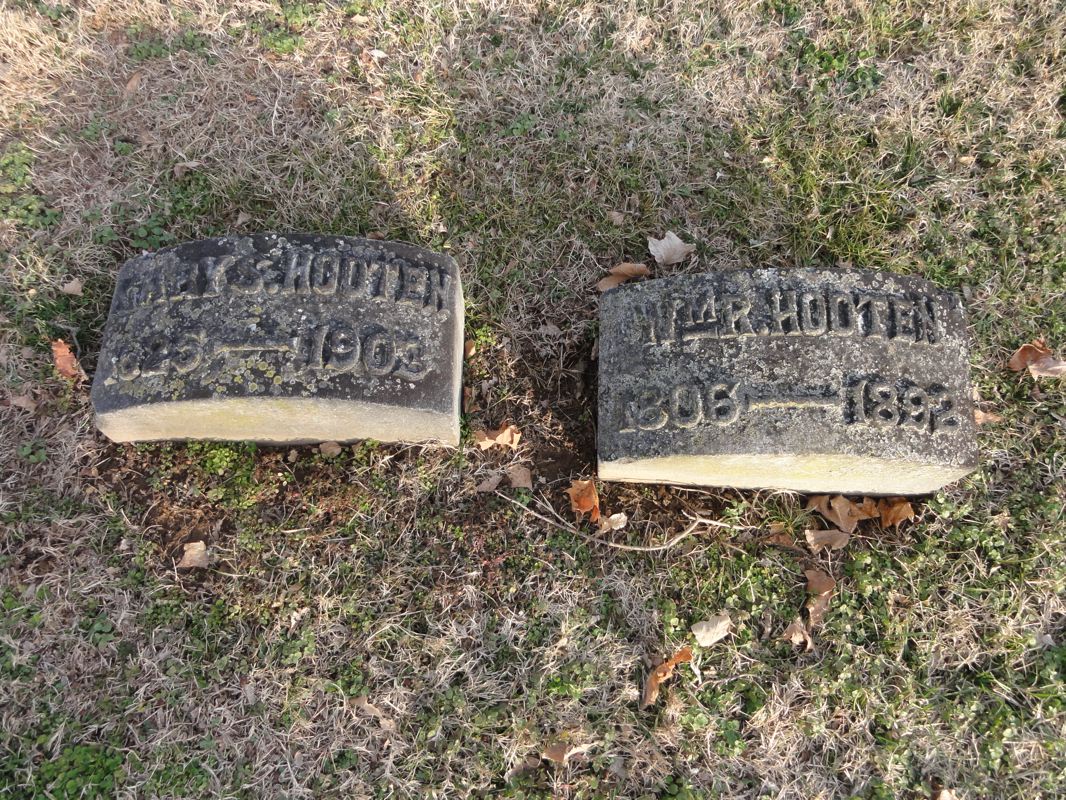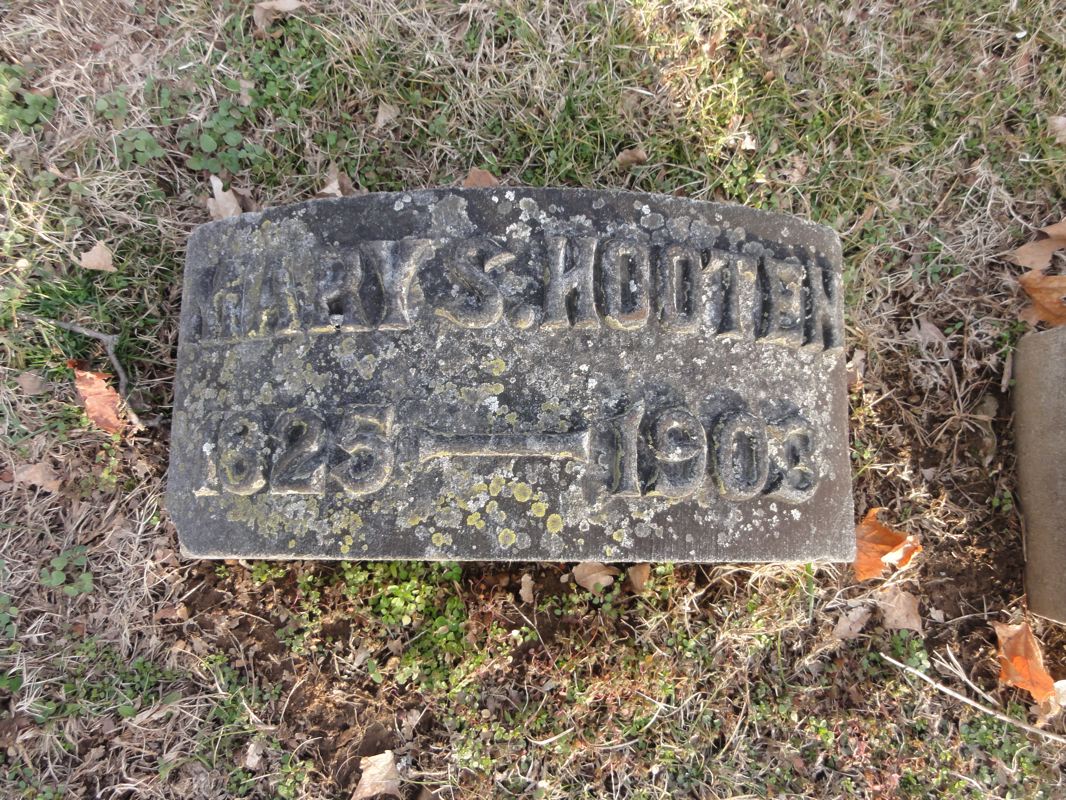William Reeves Hooten
1806-1892
contributed by: Gary Waddey (10.04.2017)
Source: The History of Davidson County, Tennessee by W.W. Clayton
![]()
William R. Hooten was born in February 13, 1806 in Grayson, Virginia. He was the son of John Hooten. The Hootens were church leaders in central Tennessee. His brother, John Hooten, Jr. preached for years around Lewisburg, Tennessee. He is buried in the Reed Cemetery in Lewisburg.
John Hooten, Sr. was a Methodist preacher who moved from Indiana to Tennessee. Upon his arrival he came in contact with the Restoration Movement. His son, William R. is said to have been one of the first traveling preacher into the state of Georgia. In a history of Georgia by Nathan W. Smith, he said that Hooten had spent the winter and spring of 1836 in Georgia. Along with Tolbert Fanning, he is perhaps the first preacher to travel into Alabama and Southern Tennessee. Some of the earliest church records in Maury County mention the work of W.R. Hooten as being one of its earliest preachers.
John & Mary S. Berry Hooten were married November 12, 1839. To this union were born eleven children, among whom were Elijah R., and William, who was ordained in 1829 – one of the first to preach in Texas. Also, Joseph Hooten, another early preacher in Texas.
W.R. Hooten passed from this life in June 28, 1892. He is buried in the Mount Olivet Cemetery, Nashville, Tennessee.
![]()
The Old Soldier Mustered Out.
William R. Hooten was born in Grayson county, Va., Feb. 13, 1806, and died March 12, 1892, at the age of eighty-six years and one month. John H. Hooten, his father, immigrated to Tennessee about the year 1811, settling in Giles county. He afterward moved to Warren county, Ky.; then returned to Bedford county, Tenn., and finally settled in Marshall county, where he died, at the advanced age of seventy-five.
William R. Hooten, the second son, received such education as the common school of his youth afforded. As he grew up, he improved every opportunity to extend his education, that he might be more useful and might the more faithfully fill the mission he so early in life realized was made incumbent upon him. The consequence was, his store of useful information in regard to things in general was by no means meagre. Being a man of fine native ability, and possessor of a laudable ambition to serve God and save souls, he spared no pains to equip himself with what in his judgment was needed for his work. Having known him intimately from my early recollection, an intimacy existing between us almost equal to that of a father and son, I have learned many things concerning his life that are calculated to help others. Often have I listened to the story of his life, especially of his religious career. He was wont to say that he deserved but little credit for being a moral man, for he was a moral boy—was reared by a pious mother, for whom he had the utmost respect. He was never disposed to go wrong. He was taught to read and respect the Bible from his youth, and began early in life to seek religion, as was the practice in those days. He was a constant attendant upon the revivals that were held in his section of country, and was a constant seeker. Seeing so many others who seemed to be successful in their efforts, who, he knew, were no more moral than himself, perhaps not his equals, and having been taught the lesson that God was no respecter of persons, he at last lost confidence in such proceedings, and came to the conclusion that all he could do was to learn the Lord's will and obey it. He at once began a more careful study of the Bible. In about his nineteenth year he attended a campmeeting in Marshall county, some eight miles from his home. His father's house was the home of the preachers, hence they all knew William and felt no little concern for his welfare. One morning at the morning devotions in the camp, one of the preachers wanted to know why he manifested so little interest in the exercises. Before this he had been much interested, always on hand, but now he seemed cool. His reply was that he had come to the conclusion that there was nothing for him in those exercises; that his only hope was to learn the will of the Lord and obey it, and leave the consequences with him. He had studied the evidences God gave of his Son, and believed that "Jesus was the Christ." He had also come to the conclusion that his next step was to confess his name and be baptized into him. He stated this to the preacher, and told him he was waiting to find someone who would attend to it for him.
The preacher replied: "I will do that much for you."
''I demand baptism at your hands at once" was the reply. It was so announced, and they went before breakfast to the water, and W. R. Hooten was baptized by Wm. D. Jordan, in Shoal Creek, Marshall county, Tenn. Going into the bushes to change his clothing! he remarked to the brethren present that he felt happy—like he wanted to shout, and he did lift his voice in praise to God. Nor from that morn did he ever entertain a single doubt upon the subject of the pardon of sins. I have heard him tell this frequently. He began at once to stir up the gift that was in him, and entered at upon the work of proclaiming the gospel to others. He preached some two years in West Tennessee; and in 1829, at old Dunlap, Hickman county, he was ordained, or set apart to the work, and went forth with the sanction and support of the brethren. He preached and built up churches in several states—Alabama, Illinois, Indiana., Georgia and Tennessee.
Bro. Hooten was a remarkable man in many respects; of humble parentage, without the facilities for the development of his powers, by force of individuality and superior qualities of his mind, he worked his way from obscurity, as it were, to great favor in the hearts of the people, and especially in the affections of the community where he lived for nearly fifty years. During this long career of about fifty years as a preacher, he received but little for his labors, never preaching for a salary.
On June 28, 1838, he was married to Mary S. Berry, of South Harpeth, Davidson county, with whom he lived ·happily and pleasantly for nearly fifty-four years, and whom he leaves on this side a little longer.
Bro. Hooten, though dead, will continue to speak. Eternity alone can measure his worth. He still lives in the hearts of those who know him, with and for whom he labored and prayed. Many of us feel that we owe more to him for his counsel, instruction, example and encouragement, than to anyone else. He was quite feeble the last few years of his stay here, but always expressed a desire to depart and be with the Lord, if it was his will. It was indeed a source of encouragement and strength to have one who spent so long a life in the service of God express so much confidence in the hope set before him. He felt that he had fought the fight, had finished the course, had kept the faith. He said in our hearing just a few days before his death, that he was not at all despondent; he knew in whom he had confided; that be had no pain; was waiting for the time to go; that he passed his hours meditating upon the promises of God. He had learned these promises when young, and it was a source of comfort to him to think of them.
"Though peace like a river attend my soul,
Or sorrows like sea billows roll,
Whatever my lot, they have taught me to say:
It is well, it is well with my soul."
Truly did it seem that death bad for him no sting. He spent his life so as to secure for himself a peaceful and quiet departure.
"Victorious his fall, he will rise as he fell,
With Jesus, his Master, in glory to dwell:
He has passed o'er the stream, and has reached the bright coast—
He died like a soldier—he died at his post."
Surrounded by loved ones who constantly attended him in his long weakness and for whom he manifested the greatest concern, saying it would be such a great relief to them if, it was the will of the Lord for him to go, he quietly passed away.
His place cannot be filled—there is no comfort like his to his lonely companion, family and friends. We can only rely upon the promises of God and wait patiently the coming of the Lord. Let us sorrow as those who have confidence in the promises of God, and prayerfully strive to so live and labor here that we may "die the death of the righteous and our last days may be like his." On Monday, March 15, 1892, surrounded by many brethren and friends, at his home near Bellevue, Davidson, Co., his body was placed in the tomb to await the summons from on high. That we all may be ready when called to meet him and all the loved ones on the heavenly, shore is my prayer.
Leiper's Fork, Apr. 16, '92.
W. ANDERSON.
Source: Gospel Advocate, April 28, 1892, p.265. Note: At some stage the bodies of William and Mary Hooten were moved to Mt. Olivet Cemetery in Nashville, Tennessee. Photos below.
![]()
ELDER WILLIAM R. HOOTEN, son of John and Mary (Reeves) Hooten, was born in Grayson Co., Va., Feb. 13, 1806. Elijah Hooten, his grandfather, was a soldier in the Revolutionary war, and was present at the surrender of Cornwallis at Yorktown. At the close of the war he settled as a farmer in Virginia, and became the father of a family of seven sons and three daughters. Elijah died in Tennessee.
John H. Hooten, his second son, emigrated to Tennessee about the year 1811, settling in Giles County. He remained here a few years, and then moved to Warren Co., Ky., afterwards returning to Bedford Co., Tenn., and finally settling in Marshall County, where he died at the advanced age of seventy-five. He was married to Miss Mary Reeves, by whom he had eleven children—seven sons and four daughters.
William R. Hooten was the second son. His education was such as the common school of his day afforded. He began to preach at the age of twenty-one, having "obeyed the call" at a very tender age. He was ordained minister of the Christian Church in 1829; is a man of fine native ability and of great executive talent. He preached, and built up churches in various States. He was ordained in Hickman Co., Tenn., subsequently preaching for two years in West Tennessee. He preached at various times in Alabama, Indiana, Illinois, and Georgia.
In the spring of 1836 he settled on the South Harpeth, in the Fourteenth Civil District of Davidson Co., Tenn.
Elder William Reeves Hooten is in many respects a remarkable man; of humble parentage, without education of a high order, by the force of his individuality and superior qualities of his mind he has won his way from obscurity to high favor in the hearts of his parishioners, and in the affections of the community in which he lives. He has during his long career of over fifty years as a preacher refused to receive any salary for his services.
He has preached at South Harpeth, Hannah’s Ford, and Sand Creek, but the principal place of worship was at Providence, until the edifice was burned. He was married June 28, 1838, to Mary S. Berry.
In 1846 he settled on some two hundred and twenty-five acres of beautiful land, where he has since resided.
In politics Mr. Hooten is a Jacksonian Democrat.
Source: History of Davidson County, Tennessee with Illustrations and Biographical Sketches of its Prominent Men and Pioneers, by Prof. W.W. Clayton, Philadelphia: J.W. Lewis & Co., c.1880. facing p. 479. Many thanks to historian Gary Waddey, who alerted us to this information and portrait sketch at the top of the page on 10.04.2017.
![]()
Wm. R. Hooten—Biographical Sketch
Sources of information; his parents and early life; trying to “get religion,” and failure; baptized when about 17, by Dr. W. D. Jordan; happy while dressing in the woods; early religious associates; efforts to learn; commences to preach; a company of young preachers, and how they lived, worked, traveled and preached; visit to Georgia, travels through West Tennessee and Alabama; debate; successes and rejoicings; never doubted, never desponded; his present condition, views and feelings as to the past, the present and the future.
The facts in this very imperfect sketch are from personal memories in early life, while Father Hooten and my brother traveled and preached together, from talks with my brother long afterwards, from recent personal conversations with Father Hooten, renewing old remembrances, etc., and with recent conversations with his neighbors and brethren, and especially with Bro. Wm. Anderson, the son of James C. Anderson, the special and tried friend and co-laborer of Father Hooten.
Father Hooten was born in Grayson county, Va., Feb. 13, 1806. His parents were sensible and religious, but not educated. His father could not read, but was an able preacher of the old gospel. Only a younger brother, Joseph, now lives—in Texas,—and preaches Christ much as the apostles, his father and his brother did. His opportunities for learning were not very good. He attended the common schools, studied much at home, read largely, and thus became quite scholarly.
When very young, he desired to be a Christian, and did as he was taught in all sincerity; he prayed, read the Bible, went often to the mourners’ bench, which was the custom then among us as well as among others. The first principles of the gospel were not understood, and there was great darkness in the pathway, even of the leaders. They had determined to follow the Bible, however, in view of being judged by it, and in order to make the best preparation they could for the account they would have to render; but it was largely, to them, a sealed book—enveloped by the traditions and teachings of men, which the reading of the Bible would never make any one think of,—and sealed by superstitious reverence for those who claimed a special call to the “Christian ministry.” Small self-esteem forbade his opposing much, especially since these preachers seemed to be entirely sincere. They told the mourners to “come up, and try again; perhaps the Lord would have mercy upon them.” Young Hooten did try many times, and most earnestly; but he got no religion, no light, no relief. Hence, he concluded he would wait a little. Perhaps there might be truth in what he had been often told, viz: That only a definite number was elected before the world began, and that no others could be saved; that human agency had nothing to do with salvation, any way; that if he was one of the elect, God would convert him at his own time, and in his own way, as he had others. This was more deeply impressed on his mind by the conscious fact, that he had done all that he could, and just as the especially called preachers taught him. Others could get through and rejoice, but he could not, though he knew he believed, repented deeply, sincerely and fully, and prayed fervently and much. His had proved a useless effort, and then it became a hopeless one. He knew he could do no more. Terrible as the consequences might be, it was no use to go through a process again that he had fully and repeatedly tried in vain.
Still, he could not give up the thought of heaven. He read the New Testament for himself; he heard the preachers read the great commission: “He that believeth and is baptized, shall be saved.” He talked with them about it. None of them understood it well. He had done all the rest, however, but there stood—“and is baptized,” just before—“shall be saved.” There was nothing else he could do. Bro. Jordan said to him: “William, you used to come to the altar, but you have not for some time. What is the matter?” He told him he had made a thorough trial of that process, and found nothing in it for him; that he had been reading, and had never found anything about the mourners’ bench or getting religion; that he had not given up the effort, however, but had determined to be baptized by the first Christian preacher he could find willing to baptize him! Bro. Jordan said, “why, William, I am the very man, I’ll baptize you on your faith in Christ!” This gladdened his heart. It was more than he expected. It was announced from the stand that they would go at once to the water, to observe the ordinance of baptism. On inquiry it was learned that Wm. Hooton was to be baptized. A friend came and asked if he had a change of clothes. He said, no. He had not thought of clothes, and would not wait on that account. They were furnished, and he was baptized. While putting on his dry clothes in the woods, he thought of the promise—shall be saved!” “He that believeth and is baptized, shall be saved!” He knew he believed, and then, for the first time, he knew and felt that he was baptized! The conclusion was irresistible—he was saved, as surely as God’s word is true, and he was unutterably happy, and praised God!
Like the rest of the young disciples, he read, studied, prayed and talked much of the Savior. They all did then. Their family prayers, prayer-meetings, etc., were common, and were wonderfully enjoyable and helpful.
It was after this that B. F. Hall, and then Walter Scott began to preach baptism for the remission of sins—and without fully understanding it themselves.
Gaining some knowledge, and increasing in zeal and confidence, he began to think of trying to preach. But the way was very dark, and he was in a maze of difficulties about it.
About this time, other young men actually began to try to preach, or exhort, poorly qualified as they were. Some of them were “licensed to exhort!” This was encouraging to William, and he began to preach in his 22nd year. Hence, the crop of young preachers that started out then, in Tennessee and North Alabama. I know not which to came first, and I fully believe that not one of them would have taken precedence of another, if he could. They had no such personal feelings or purposes. They loved Christ and the souls of men, and hoped to do a little for the world. My impression was then—and it is now—that not one of them ever contemplated being a big preacher. Nor could they have hoped for human honor or applause, for money, worldly honor or ease. Nothing of the kind was in their vision. This world promised about the same to them it did to Paul—and it gave them much the same—less the stripes and imprisonments. The wicked world stood against them. Romanists, protestants and religionists of all classes were against them. They had only themselves—a small and despised few, laughed at and scowled upon—and the Bible, its divine author, the Holy Spirit, the angels and the spirits of just men made perfect. But here was a host, and it is not wonderful that they succeeded.
NAMES IN THIS PREACHER BAND.
In this community the best remembered names, perhaps, will be: Tolbert Fanning and Wm. R. Hooten. Then come James C. Anderson, Allen Kendrick, Thacker Y. Griffin, Lynn De Spain, J. M. Fanning, W. H. Wharton, Crockett McDonald, John McDonald, ——. Wilkes, Jerry and Dow Randolph, James Young, James Gilliland, James Holmes, Christopher Gist, the Sewells and Sowells, B. F. Hall, W. D. Jordan, J . R. Howard, the Lipscombs, and others. An older crop included: E. D. Moore, Jas. E. Matthews, M. W. Matthews, Robert and Elisha Randolph, S. B. Giles, S. Strickland, J. K. Speer, Abner Hill, the elder Hooten, Judge Mack, E. H. Osborne, Joe Callahan, Abner Peter, J. J. Trott, Calvin Curlee, Andrew Craig, Joel Anderson, Andrew P. Davis, and others.
Do not such names deserve to be put on undying record? Would it not be base ingratitude to forget them, or neglect to honor them? Not one of them looked for earthly reward; and not one of them, as to this, was disappointed. However, it might be said of some preachers that they preached for the money there was in it, this could not be said of them. They stood, in this respect, like Caesar’s wife—beyond reproach. They might have gone fishing, hunting, to the field, the shop, or tent making, or to get money by honest toil, but net to preaching. Had they been weak enough to start with this purpose, a little experience, such as they all had, would have soon cured them of the delusion. But they did not start with any earthly motive, and they never stopped for anything.
INCIDENT WITH MORMON PREACHERS.
Father Hooten spent some time in Georgia, but was married in Tennessee, June 28, 1838, to Miss Mary Berry. Two learned Mormon preachers were captivating the people. They claimed that they could do such miracles as the apostles did, if the people had faith. One of them said he was an apostle, the other claimed to be one of the seventy. In their controversy Bro. H. told them that the miracles were done in order to faith; not faith exercised in order to miracles. This he proved by nature and scripture, and then told the people and the preachers, that he was to Mormonism what Elymas was to Paul and Christianity. Elymas withstood Paul, and he withstood Mormonism and these preachers; Paul struck Elymas blind, and he invited them to strike him blind, and he would preach Mormonism the rest of his days—whether they chose to restore his sight or not! They did not strike! They struck their tents, and left.
Many churches stand today monuments of his labors. He continued his work without regard to anything but doing good, so long as he was able to go at all. Many interesting incidents might be given.
HIS PRESENT CONDITION AND PROSPECT.
He had no children of his own, but did much for others. He has a good farm in Davidson county, but lived with Dr. Compton, whose wife he raised, and calls his daughter. She and her husband are most excellent and devout Christians. Father Hooten is in good general health now, in his eighty-fifth year, except he is partly paralyzed, so that he talks with some difficulty, and can only walk across the house when carefully raised up and steadied, using two sticks. But he is almost entirely free from pain, and is very forward to praise the Lord for the right use of his mind, exemption from pain, for being able to read the Bible, which he cherishes with increased tenderness, and for all the needed blessings of life. He says: “I am happy, bless the Lord! I don’t lack anything. My old woman is just as kind as she can be, and my children, the doctor and his wife, are just as good to me as they can be.”
I told him I rejoiced in his happiness, and was glad to hear him talk so. He said: “Oh! it is so; and I ought to say so. I have had my trials and persecutions, but the Lord has been very gracious to me all my life.” I told him that was the kind of testimony to encourage the young; that, so king David testified; and that I heard, recently, an old sister who had suffered much and in many ways, say voluntarily: “The Lord is very gracious to me in my old days; my daughter is just as kind to me as she can be, and my son-in-law could not be any better; he seems to enjoy making me happy, and I lack no good thing; the only thing that grieves me at all is, that the church is not doing better—and it is improving now.” This is the testimony of the wife of one of this crop of young preachers.
A Note.—My observation as to old preachers and their wives, who went out in early life, trusting in God alone, receiving almost no earthly support, and encountering many hardships, is exceedingly comforting and encouraging. The experience of these two old people is their experience generally. They realize the divine promise: “The end of that man is peace." “His last days shall be his best days.” “The path of the just shineth brighter and brighter until the perfect day.” Men with little faith talk of “laying up for a rainy day, and for old age.” God is showing, in these instances, that he cares for his aged servants, and is their “exceeding great reward.” This is the testimony of old acquaintances I met in all my travels. They all had their trials, but, with the blessings of God, they have been all the while far happier than the wicked; and in the evening of life they begin to reap their reward. Thank God for this.
HOW HE REGARDS THE CHURCH AS IT IS.
He said: “We used to love one another, and would not wound each other’s feelings for anything. We delighted to make sacrifices to please and comfort each other, and we prayed much, and studied the Bible daily. I am sorry it is not so now. Pride and worldliness seem to prevail now very largely. And the departures from the simplicity of the gospel are great and increasing. We did not use to have any of these societies, festivals, etc. The churches did not wait for preachers, they met and worshiped without them, and encouraged the preachers to go out where they were needed. They only needed them occasionally, and if they did not support them well, they always encouraged them to go out, instead of calling them in to be unscriptural pastors, as they are now doing. Nobody thought of instrumental music in the worship. It would have been worse to us than the old-fashioned mourners’ bench, which we soon learned to regard as an abomination. And we did not have the flowery operatic airs now sung. We sang plain songs and tunes, and we sang with the spirit and with the understanding. We used to go around and shake hands too, and rejoice. Now I believe they think it is hardly polite to shake hands! The preacher must do this also for the members! We used to read and exhort one another—many taking part. Now, all must sit still, and be exhorted, one man doing all, except a very little stiff and formal singing. I like preaching, and I like to see things nice and orderly; but I don’t like this modern preacher or clergy way of doing.
“I know we used to succeed much better when we had no organization or society but the church; and I see now how we might have done even much, better— as some are doing now, and as the primitive Christians did. I would not hurt the feelings of one of my brothers or sisters for all the humanly organized societies, and for all the organs on earth! No, I would not! I love my brethren, I love peace and good will, and I cannot “sow discord among brethren” for the sake of an organ, or a human society, or anything else not necessary to the worship or the spread of the gospel. We know the first Christians had none of these things, and that they are not in the New Testament. To say they are necessary is to say the New Testament is not complete. That won’t do. It is perfect, and we must not incumber it with human inventions.
“And these preachers who must be hired and have man’s assurance of pay before they will either go or come and preach!—I don’t want any of them. It we had done so when I was young there would have been no preaching. And so it was in the days of Paul. But Paul trusted in God, and was ready to suffer for the Savior. That is the way we felt in my young days, and the way we had to do, or not preach at all. But we never suffered as much as Paul did; and we ought to be ashamed to complain. Lord, forgive roe, if I ever did complain for anything I had to do or to suffer for Jesus! Bless the Lord! he has never forsaken me or failed to be my comfort and help.
“But, Bro. Κ., don’t let the disciples be discouraged. This reformation is not a failure. The Lord’s cause is not a failure. It never will fail. The dancing, money-loving, organ-loving, society-loving, and such as love the praise of men more than the praise of God, and seek the pleasures of the world more than the welfare of the church—may fail. Yes, they may fail. They are failures now. I guess many of them failed before they started. They never wholly cut loose from the world, and never got rightly on the king’s highway. They are just beating about in the dark and hoping without any solid foundation or true light. They are the chaff, the bad fish and the foolish virgins. But the cause of Christ will not fail! The wise-hearted and true will not fail. And when this effort to worldlyize and sectarianize the churches has spent its force, and these leaders have gone to their own place, we shall be the better and stronger for the storm and trial of our faith and patience! No, I need not say we, for I shall not be here long now! But I feel like saying we; and I think I will still have and feel an interest in this glorious work! If I pause to listen to the songs of the ransomed, and to greet old friends on the golden shores, I imagine I will still think of my earth life, and my earth friends, and will gaze upon the struggles of the faithful! Perhaps I cannot come back and help any more, but I don’t know! And I am sure the Lord will raise up young and strong men, and hosts of all classes, who will carry this cause forward to great victory! No, don’t let them be discouraged. The Lord bless you, my dear brother! Ο, I am so glad you came to see me!”
Note.—I sent this to Father Hooten, and received this reply:— Bellvue, Tenn, June 4, 1800, Bro. Kendrick: “I have read what you have written, and it has my hearty approval.” —''W.R. Hooten.
He also sent a few additional names for the list of preachers, and some dates, which are inserted. Sixty-eight years in the divine service, and sixty-two as a faithful preacher of the old gospel is a life worth recording.
C. K.
-Carroll Kendrick, Gospel Advocate, June 18, 1890, page 392,393.
![]()
Directions To The Grave of William R. & Mary S. Hooten
The William R. and Mary Hooten family plot is locate in the old cemetery at Mount Olivet. He lies among many of the saints who built the church in Nashville, and throughout the land. The cemetery is located at 1101 Lebanon Pike, Southeast of downtown Nashville. Click over to Mt. Olivet for map and location of the grave in the cemetery. His remains rest in Section 14. See pinpointed location on Mount Olivet map here. Section 14, Lot 145
Editor's Note: Finding the grave of William R. Hooten has been a great accomplishment. I have been searching for the final resting place of this man for years. As he was one of the earliest preachers of the gospel in my home states of both Alabama and Georgia, it was very important to locate his grave.
Grave Location
Section 14, Lot 145
GPS Location of the grave
36°08'46.9";N 86°44'03.2";W
or D.d. 36.146354, -86.734219
![]()
![]()

